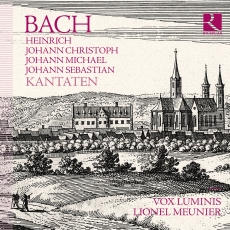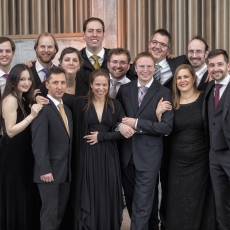Vox Luminis - Kantaten - BBC Music Magazine
JS Bach devoted years to tracing his composer forefathers, and in this spellbinding performance Vox Luminis explores their favourite genre, the cantata. Bach’s great uncle Heinrich and his sons took up Schütz-styled writing to exploit anew the cantata’s sudden fluid shifts, from instrumental to vocal solo, from homophony to polyphony, and from single to double choir. These early Bachs forged tools – complex counterpoint with lilting rhythms and urgent, fanciful rhetoric for one, two and three solo voices – that JS Bach would use to write what was probably his first cantata, Christ lag in Todesbanden. Here JS experimented even more daringly than the Bachs before him, and Vox Luminis’s programme peaks with a benchmark recording.
These Bach family cantatas capture what Vox Luminis does best. When singing as an ensemble, the vocalists draw us into intricate works with a pellucid yet robust timbre. Details register with ringing clarity, whether as motifs passing between soloists, as the creamy blend of voice with instrument in a shared line, or as the joint intake of breath to exploit a rhetorical pause. The performers spring delightful surprises, such as a slow-motion accelerando towards a stretta finale which sneaks up and then takes over in Heinrich Bach’s Ich danke dir Gott. In JC Bach’s Herr, wende dich, nimbleness becomes art: in this mini-drama, in which the bass voice of Christ soothes three penitent believers, double choir and double band banter at dizzying speed, then coalesce unexpectedly into suave homophony. The performers’ grace of execution makes up for occasional vocal fragility; if the two countertenors strain a bit, this only adds credibility.
Artistry strikes home in Christ lag in Todesbanden, restored here to its first version, which scholars think was composed around 1706. JS Bach draped the cantus firmus, which for each movement is the chorale melody named in the cantata’s title, in increasingly ornate vocal and instrumental species counterpoint. Director Lionel Meunier delicately separates lines even as they proliferate, allowing the full glory of Bach’s craft to break forth as the work progresses. The pacing is exquisite, the textural contrasts striking, and each musician, vocal and
The vocalists draw us into intricate works with a pellucid yet robust timbre instrumental, adjusts subtly when a new part joins their own. Bart Jacobs plays a gorgeously voiced organ built in 2002; this instrument’s qualities, and Jacobs’s deft registration, melt within any texture. It is this recording’s intimacy with its sources, sound and performers that sets it apart from other renowned readings, by for instance the Monteverdi Choir, Collegium Vocale Gent, or Taverner Consort. Rounding off Meunier’s project is JC Bach’s Es erhub sich ein Streit. Its majesty offsets the ethereality of Christ lag in Todesbanden: under Meunier’s direction, JC Bach’s double five-voice choir with timpani, four trumpets and six-part strings assume a rugged splendour. In this project Vox Luminis celebrates not just the Bach family, but the power of music-making itself.

